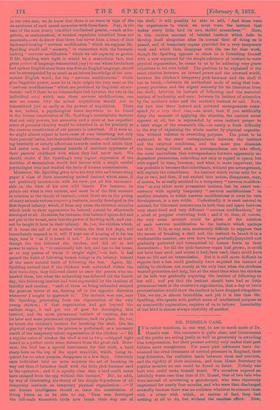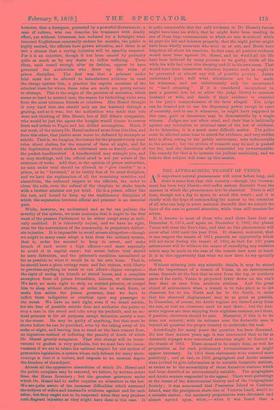DR. HESSEL'S CASE.
TT is rather vexatious, in one way, to see so much made of Dr.
liessers case. His innocence is quite clear, and Government and the public are acting justly as well as generously in awarding him compensation, bat their present activity only makes their past failures more conspicuous. For years past reformers have de- nonnced the cruel treatment of untried prisoners in England, their long detention, the confusion made between them and convicts, and the rigidity of their seclusion, and from Home Secretary to popular member no one could be found to listen. Nobody was hurt who could make himself heard. We ourselves exposed an infinitely worse case than that of Dr. Hesse', that of two lads who were accused of murdering a gamekeeper, who were rigorously imprisoned for nearly four months, and who were then discharged- avowedly because there was no evidence whatever to connect them with a crime with which, as matter of fact, they had. nothing at all to do, but without the smallest effect. Now,
however, that a foreigner, protected by a powerful Government, a man of culture, who can describe his treatment with deadly effect, yet withont bitterness, has endured for a fortnight what innocent Englishmen constantly endure for months, the public is highly excited, the officials have grown attentive, -and there is at last a chance that a crying injustice will be speedily removed. For it is an injustice, though it has been caused by pedantry quite as much as by any desire to inflict suffering. Three ideas, each sound enough after its fashion, appear to have governed the authorities who drew up the rules of
prison discipline. The first was that a prisoner under trial must not be allowed to manufacture evidence to meet the charge against him, a practice the regular members of the criminal class for whom these rules are made are pretty certain to attempt. This is the origin of the practice of seclusion, which seems so hard to untried men, the reason for forbidding visits even from the most intimate friends or relatives. Mrs. Hemel thought it very hard that she should only see her hasband through a grating, and so it was ; but the authorities who made that rule were not thinking of Mrs. Hesse], but of Bill Sikes's companion, who-would be just the agent the burglar would choose to convey hints and orders to Fagin and his drilled accomplices. Much, if not most, of the misery Dr. Hessel endured arose from this idea, and from this other, that justice must never be defeated by attempts at suicide. That is, we imagine, the reason for the preposterously -cruel rates -about clothes, for the removal of them at night, and for the deprivation which strikes cultivated men so keenly,—that of the pocket-handkerchief. A handkerchief may strangle you, and so may stockings, and the official mind is not yet aware of the existence of socks. Add that, in the opinion of prison authorities, no man under trial should be allowed to "give trouble" in a prison, or be "favoured," or be visibly free of its usual discipline, and we have the explanation of all the remaining cruelties and absurdities, the enforced respect to the officials, the order to clean the cells, even the refusal of the chaplain to shake hands with a brother minister not yet tried. He is a prison officer like the rest, and bound to keep up the traditionary discipline of which theseparation between official and prisoner is an essential part.
While, however, we understand and so far can palliate the severity of the system, we must maintain that it ought in the first week of the present Parliament to be either swept away or radi- cally modified. It is inherently unjust, and we have no right, even for the convenience of the community, to perpetrate deliber- ate-injustice. It is impossible to avoid arrests altogether—though we might in many cases adopt a hint from the military system, that is, order the accused to keep in arrest, and make breach of such arrest a high offence—and more especially to avoid it in capital cases ; but arrest before trial should be mere detention, and the prisoner's condition assimilated as far as possible to what it would be in his own home. That is, he should have a plain cottage room and fair rations, with liberty to purchase anything he needs or can afford—liquor excepted— the right of seeing his friends at stated hours, and a complete exemption from all prison formalities, labours, or observances. We have no more right to strip an untried prisoner, or compel him to sleep without clothes, or order him to wash floors, or make him salute the prison governor, than we have to inflict these indignities or cruelties upon any passenger in the street. We have no such right, even if we dread suicide, for the fear ef possible suicide does not authorise the police to stop a man in the street and tike away his penknife, and an un- tried prisoner is for all purpose except detention merely a man in the street. He may be guilty of anything, but that must be shown before he can be punished, even by the taking away of his socks at night, and leaving him to tread on the bare cement floor, an ingenious method of inflicting the penalty of death of which Dr. liessel greatly complains. That this change will be incon- venient to gaolers is very probable, but we must face the incon- venience if we are to retain_ the national respect for our system of preventive legislation, a system whose only defence for many short- comings is that it is lenient, and respects to an unusual degree the freedom of the subject.
Almost all the oppressive absurdities of which Dr. Hassel and the public complain may be removed, we believe, by written orders from the Home Secretary ; but the greatest „grievance under which Dr. Hamel had to suffer requires an alteration in the law. We are quite aware of the immense difficulties which surround the-subject of wife's and husband's evidence against and for each ether, but they ought not to be respected when they may produce such :flagrant injustice .as they might have done in this case. It is quite conceivable that the only evidence in Dr. Hessel'a favour might have been his wife's, that he might have been residing in one of those huge caravanserais in which no one is noticed while he pays his bill and behaves properly, that the night porter might have been wholly uncertain who went in or out, and Boots have forgotten all about his numbers. In that case, all positive evidence would have been against Dr. 'Teasel, and he would all his life have been believed by many persons to be guilty, while all the while his wife had seen him sleeping and ill in his own room. That would have been monstrous injustice, injustice such as ought to be prevented at almost any risk of possible perjury. Juries understand quite well what allowances are to be made for witnesses, and are unfortunately only too accustomed
to "hard swearing." If it is considered inexpedient to pass a general law, let us allow the judge liberty to summon husband or wife, and decide if their evidence is essential to the jury's comprehension of the facts alleged. The judge can be trusted not to use his dispensing power except in cases of necessity, and to use it whenever, as might have happened in this case, guilt or innocence may be demonstrable by a single witness. Judges are not often cruel, and their bias is habitually against any relaxation in criminal cases of the law of evidence. As to detention, it is a much more difficult matter. The police must be allowed some time to search for evidence, and very sudden trial is often, owing to the public excitement, very unfavourable to the accused ; but the system of remands may be and is pushed too far, and the detentions after committal are unwarrantable. The remedy for that is to increase the judicial machinery, and we believe that subject will come up this session.



































 Previous page
Previous page